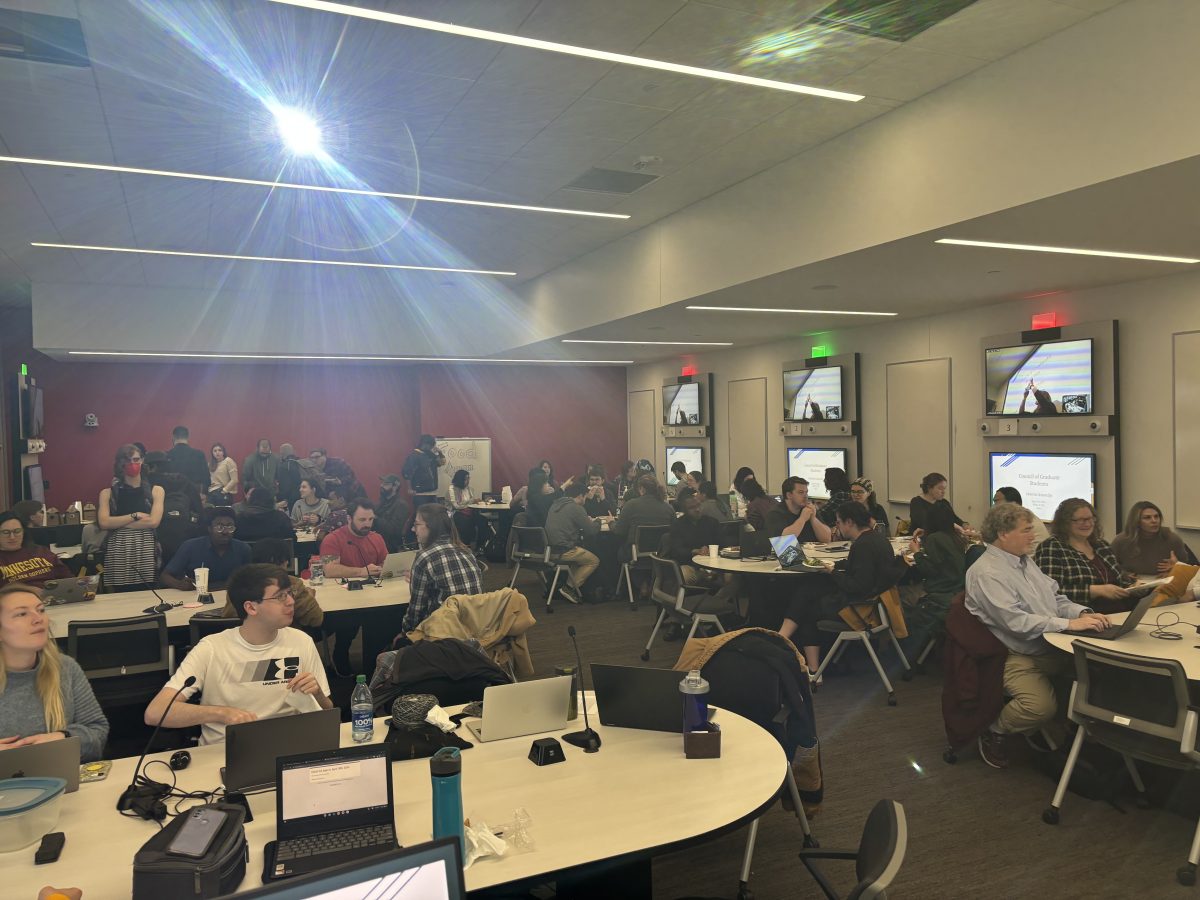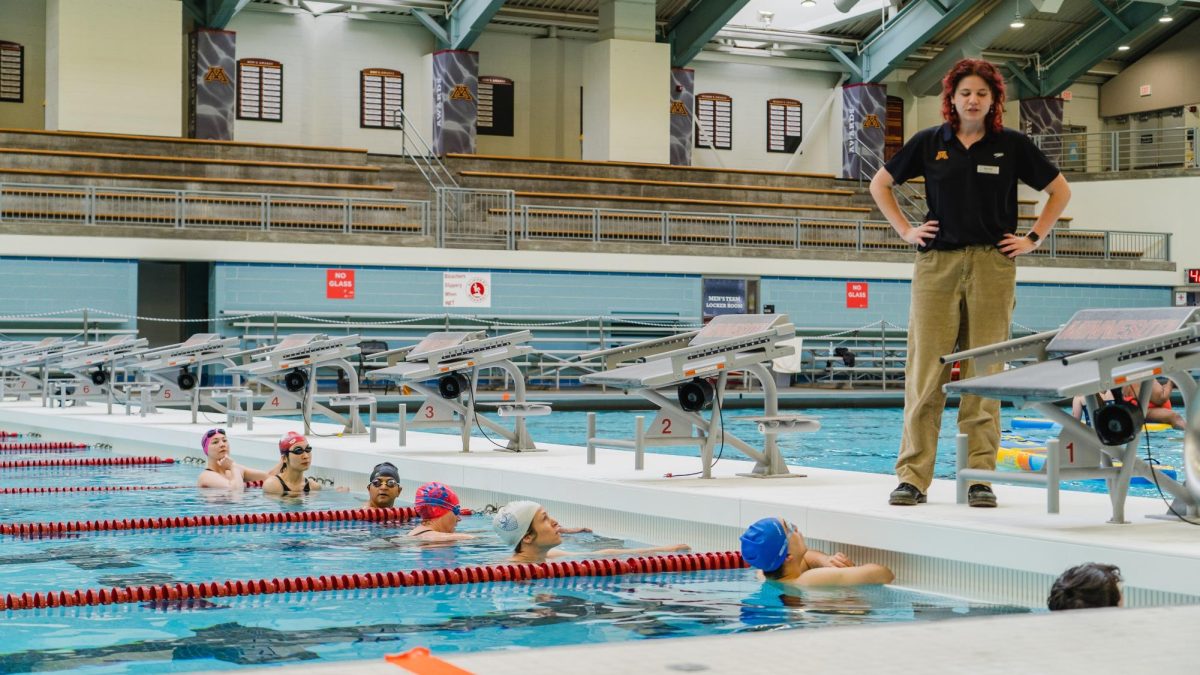As the academic year draws to a close, the University of Minnesota’s Council of Graduate Students (COGS) looks back on its accomplishments.
COGS leadership cited resource accessibility, collaboration with the still-new graduate student union and work with the University’s administration as some of their primary successes.
COGS Speaker Mary Kate Wolken said COGS “had an ambitious set of goals” for itself going into this year.
Though it is challenging for COGS to measure its progress given the difficulty of obtaining tangible results in its line of work, Wolken said she is confident in the progress COGS made this year in support of graduate students, career services, housing and resource accessibility.
“It’s not just enough for the University to have resources,” Wolken said. “Accessibility to those resources is essential.”
Many of the resources available to the University’s undergraduate population are not available to graduate students, according to Wolken. This year, COGS has worked to centralize resources and connect graduate students with them.
COGS Director of Internal Relations Felix Cheuk Wun Ting said one way COGS has done this is by creating a resource packet for graduate students. The Graduate Student Resource Guide is organized categorically and guides graduate students to an array of resources, including those for academics, professional development, food, legal advice and mental health, among others.
Cheuk Wun Ting, who will replace Wolken next year as COGS speaker, said he promoted the guide to incoming graduate students at orientation this year and received positive feedback. He added that COGS hopes to continue adding to it in the future since the guide is not an exhaustive list.
Wolken said one of COGS’ internal goals for the year was to navigate differences between COGS and the Graduate Labor Union-United Electrical (GLU-UE), which unionized in April 2023. Since GLU-UE’s formation, issues of labor and pay for graduate students are no longer under COGS’ purview.
While GLU-UE represents all graduate student workers, COGS is the representative body for the entire graduate student population, according to Wolken.
“We have a very open relationship with GLU-UE,” Wolken said. “We’re not competing with each other, obviously. We’re working in our own lanes.”
Wolken added that the relationship has been “a synergistic situation,” allowing both groups to use different mechanisms to achieve common goals. GLU-UE’s existence allowed COGS to focus on other advocacy issues, which they have had success with this year.
Cheuk Wun Ting said despite pay now being under GLU-UE’s purview, COGS is still advocating for graduate-student-related issues, including housing, food, transportation, mental health and other campus resources, which the resource guide aims, in part, to mitigate.
“It shouldn’t just be considered as some kind of bargaining process,” Cheuk Wun Ting said. “It’s part of students’ lives, and so COGS is still responsible for all these things.”
Wolken said COGS has not had much success in discussing issues with University administration related to international graduate students.
Despite this setback, Cheuk Wun Ting, who also serves as director of finance for the Council of International Graduate Students (CIGS), said COGS and CIGS are working together to solve problems related to international graduate students, which they will continue to do next year.
This year has still seen a lot of effort between COGS and University administration to figure out when the administration can and should collaborate with COGS, Wolken said.
Taiwo Aremu, COGS’ representative to the Board of Regents, said COGS has advocated for the inclusion of graduate student voices in key administrative duties this year.
Board of Regents Co-Vice Chair Mike Kenyanya and Regent Robyn Gulley both attended COGS general assembly meetings this year, according to Aremu, which COGS hopes will increase advocacy for graduate students by the Regents.
“These two folks that showed up now know what COGS is all about,” Aremu said. “They know our priorities. They know our strategic goals. They know how important we are to the University.”
COGS hopes to host more regents at its general assembly meetings next semester, Cheuk Wun Ting said.
University administration has similarly hosted graduate students in committee meetings, interviews and other key decision-making forums over the year, according to Aremu.
Aremu said he recently attended interviews with a potential University chief investment officer and a potential Senate director.
COGS was involved in advocacy efforts last fall to ensure student inclusion in the presidential search, which confirmed Rebecca Cunningham’s presidency in February.
In October, COGS collaborated with other University student governance organizations to release a joint letter advocating for greater student inclusion in the search.
Interim President Jeff Ettinger also reinstated the presidential visit with COGS, Wolken said. Both Ettinger and Provost Rachel Croson attended the COGS April general assembly meeting for a special session — an invaluable face-to-face interaction between graduate students and University administrators.
“I cannot even emphasize how big of a deal this was,” Wolken said.
The upcoming year will bring great change for the University, according to Wolken, but COGS will continue to advocate for graduate students as it always has.
“I am very confident that we have shaken up a lot of conversations and forced the administration to seriously consider some systemic changes,” Wolken said.














